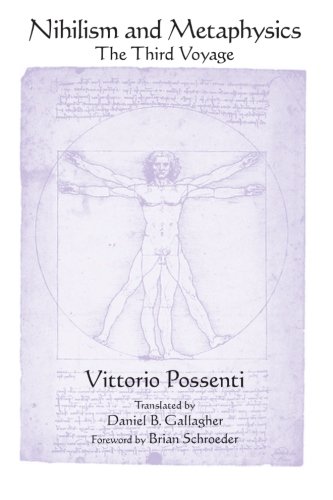 Nihilism and Metaphysics: The Third Voyage, by Vittorio Possenti, translated by Daniel B. Gallagher, with a foreword by Brian Schroeder (SUNY; Published: January 2, 2015; 424+ pp).
Nihilism and Metaphysics: The Third Voyage, by Vittorio Possenti, translated by Daniel B. Gallagher, with a foreword by Brian Schroeder (SUNY; Published: January 2, 2015; 424+ pp).
[Purchase: Amazon.com [1] | Amazon.co.uk [2]]
Book description:
Challenging the idea that nihilism has supplanted metaphysics, Vittorio Possenti finds in this philosophical turn the grounds for a mature renewal of metaphysics. Possenti takes the reader on a “third voyage” that goes beyond the “second voyage” indicated by Plato in the Phaedo. He traces the ascendancy of nihilism in philosophy, offering critical examinations of Nietzsche, Gentile, Heidegger, Habermas, Husserl, Gadamer, Ricoeur, and Vattimo. With penetrating accounts of philosophical movements such as hermeneutics and logical empiricism, rich with both historical and theoretical insights, Possenti provides a compelling defense of the power of human reason to apprehend the most obvious but also the most profound aspect of things: that they exist. By exploring the ubiquity of nihilism and probing its philosophical roots, Possenti clears the way for a fresh reformulation of metaphysics.
Brief author biography of Vittorio Possenti (taken from here [3] with translation assistance provided by Damian Bacich):
During the years of his high school and university education, Vittorio Possenti was attracted to the history of civilizations, which was inspired by his youthful readings of Giambattista Vico and Arnold Toynbee as well as an epistemology of physics and the general logic of scientific theories (Albert Einstein, Percy Williams Bridgman). He absorbed Einstein’s idea that philosophical theories should be built upon a straightforward, generalized scientific basis, and became interested in the conflict between religion and science that centered on the idea of an Absolute personal / impersonal distinction. When he was twenty, Possenti discovered the application of metaphysical and humanist thought through the works of Jacques Maritain and Thomas Aquinas, and he sensed the speculative and liberating possibilities that are to be found within in the Christian revelation. Possenti was influenced by the philosophy of being, the tradition of personalism, and the school of cognitive realism, which are based on the idea that philosophy is not “lunar” knowledge, that is, a knowledge that lives as ‘reflected’ light and without a specific object, but instead is a knowledge that has its own access to the real where its structure is eminently knowable. Participation in civil and theological debates of the sixties revealed certain political horizons, including that of peace, while a permanent interest has oriented Possenti toward the interplay between the Christian message and moral and civil. The study of several predominant philosophies from Aristotle to Kant, Schelling to Nietzsche, Heidegger to Bergson, and by Giovanni Gentile to Karl Popper, has enabled a comparison with different positions and enriched Possenti’s overall approach.
[Purchase: Amazon.com [1] | Amazon.co.uk [2]]
